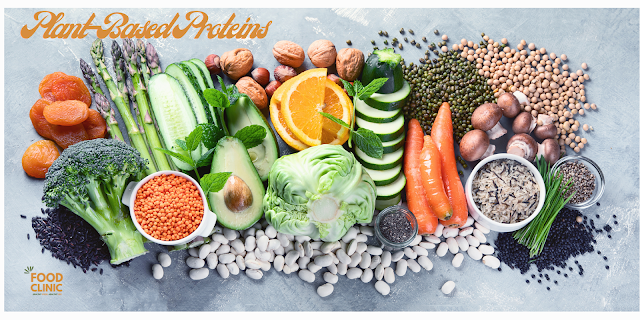Elevate your diet by adding Plant-Based Proteins
Plant-Based Proteins
Plant-based proteins have become increasingly popular among people who want to maintain a healthy lifestyle. Unlike animal-based proteins, plant-based proteins are cholesterol-free and contain essential nutrients that the body needs to function properly. In this article, we'll explore the nutritional benefits of plant-based proteins and offer tips on how to incorporate them into your diet.
Plant-based diets are a great way to consume essential nutrients such as protein. Protein is necessary for repairing and building tissues, maintaining strong bones, and supporting the immune system. Plant-based protein sources include legumes such as beans, lentils, and chickpeas; nuts and seeds such as almonds, pumpkin seeds, and chia seeds; whole grains like quinoa, brown rice, and oats; and vegetables such as spinach, broccoli, and sweet potatoes.
Combining different plant-based protein sources can create a complete protein containing all essential amino acids. A balanced plant-based diet can be both nutritious and delicious, providing all the necessary nutrients for a healthy body and mind.
Benefits of a Plant-Based Diet
Plant-based diets have gained popularity in recent years due to their numerous health benefits. Consuming more fruits, vegetables, legumes, and whole grains can provide essential vitamins, minerals, and fiber that are often lacking in a typical Western diet.
One of the most common attributes of a plant-based diet is the adequacy of protein intake. Plant-based sources such as soy, lentils, chickpeas, and quinoa are excellent sources of protein. Additionally, combining different plant-based protein sources can ensure adequate intake of all essential amino acids.
One of the primary benefits of plant-based proteins is their high fiber content. Fiber is essential for maintaining good digestive health and can also help lower cholesterol levels. Foods that are high in fiber include legumes (such as lentils, chickpeas, and beans), whole grains, and vegetables like broccoli and Brussels sprouts.
Another important benefit of plant-based proteins is their low saturated fat content. Saturated fat is a type of fat that can contribute to heart disease, and reducing its intake is crucial for maintaining good heart health. Some excellent sources of plant-based proteins that are low in saturated fat include tofu, tempeh, and seitan.
Plant-based proteins are also rich in vitamins and minerals that the body needs to function properly. For example, legumes are excellent sources of iron, which is essential for producing red blood cells. Nuts and seeds are rich in healthy fats and contain important nutrients like vitamin E, magnesium, and zinc.
A plant-based diet has been linked to a reduced risk of chronic diseases such as heart disease, type 2 diabetes, and certain cancers. It can also lead to a healthier weight and improved digestion.
Transitioning to a plant-based diet can have a positive impact on both personal health and the environment. With careful attention to protein sources, it can be a well-rounded and fulfilling way of eating.
Unlocking the Nutritional benefits of plant-based proteins for a healthier you
Protein-based diet overview
Plant-based protein sources are becoming increasingly popular as people seek to reduce their intake of animal products. Legumes, nuts, and whole grains are great sources of protein. Legumes such as beans, lentils, and peas are high in fiber, which can help with digestion and weight management. Nuts such as almonds, cashews, and peanuts are also good sources of protein and contain healthy fats. Whole grains like quinoa and brown rice are another option for plant-based protein and are also high in fiber. Other plant-based protein sources include tofu, tempeh, and seitan. Tempeh is made from fermented soybeans and is a great source of probiotics. Seitan is made from wheat gluten and has a meaty texture that can be used as a meat substitute.
Plant-based protein sources offer a variety of options for those looking to reduce their intake of animal products while still maintaining a healthy diet. Adding plant-based protein sources to your diet can provide essential nutrients and help you meet your protein requirements without consuming animal products. Some examples include quinoa, lentils, chickpeas, tofu, and hemp seeds. To increase your intake of plant-based protein, choose whole foods like lentils, beans, tofu, tempeh, nuts, and seeds, and experiment with meat alternatives like veggie burgers and sausages made from plant-based sources such as soy, pea, and wheat protein. Incorporate protein-rich vegetables like broccoli, spinach, and Brussels sprouts into your meals and snack on nuts and seeds, or try adding plant-based protein powders to your smoothies, oatmeal, or pancakes.
Learn more about the nutritional sources of plant-based proteins
Plant-based protein sources analysis.
Plant-based protein sources are an excellent way to add protein to your diet without consuming animal products. Here are five different plant-based protein sources that you should consider:
Quinoa: Quinoa is a superfood that is loaded with protein, fiber, and a variety of other nutrients. One cup of cooked quinoa contains about 8 grams of protein.
Lentils: Lentils are a legume that is rich in protein, fiber, and iron. One cup of cooked lentils contains about 18 grams of protein.
Chickpeas: Chickpeas, also known as garbanzo beans, are a versatile plant-based protein source. They are high in protein, fiber, and folate. One cup of cooked chickpeas contains about 15 grams of protein.
Tofu: Tofu is made from soybeans and is a popular plant-based protein source. It is high in protein, calcium, and iron. One cup of firm tofu contains about 20 grams of protein.
Hemp seeds: Hemp seeds are a complete protein source that is high in omega-3 fatty acids and fiber. Two tablespoons of hemp seeds contain about 6 grams of protein.
These five plant-based protein sources are not only delicious but also nutritious. Adding them to your diet can provide you with essential nutrients and help you meet your protein requirements without consuming animal products.
Learn more about protein-based sources analysis
Tips for plant-based protein.
Incorporating more plant-based protein into meals and snacks can have numerous health benefits, including reducing the risk of chronic diseases and improving overall well-being. To incorporate more plant-based proteins into your diet, try adding a variety of beans, lentils, and peas to soups, stews, and salads. You can also swap out meat for tofu, tempeh, or seitan in your favorite recipes.
Here are some tips to help you increase your intake of plant-based protein:
Choose whole foods: Opt for whole plant-based sources of protein such as lentils, beans, tofu, tempeh, nuts, and seeds.
Experiment with meat alternatives: Try meat alternatives like veggie burgers, sausages, and meatballs made from plant-based sources such as soy, pea, and wheat protein.
Incorporate protein-rich vegetables: Include vegetables like broccoli, spinach, and Brussels sprouts in your meals.
Snack on nuts and seeds: Snacking on nuts and seeds is an easy way to add more plant-based protein to your diet, and incorporating more vegetables into your meals can help increase your overall fiber intake. Grab a handful of nuts or seeds as a snack, or add them to salads, oatmeal, or smoothies.
Try plant-based protein powders: Mix plant-based protein powders into smoothies, oatmeal, or pancakes for an extra protein boost.
By incorporating these tips into your daily routine, you can easily increase your intake of plant-based protein and improve your overall health.
Conclusion
Plant-based proteins offer numerous health benefits and are a delicious and nutritious addition to any diet, and can help improve your overall health. With a wide variety of options available, it is easy to incorporate more plant-based proteins into your diet, leading to improved digestion, reduced risk of chronic diseases, and a healthy lifestyle. So go ahead and give them a try, your body will thank you for it!
Take control of your health today and elevate your diet with the nutritional benefits of plant-based proteins.





This is top-notch
ReplyDeleteWow, this is amazing
ReplyDeleteThis comment has been removed by the author.
ReplyDeleteWhat an amazing article. This is indeed a revelation of vegetables mystery. I feel like incorporating vegetables in all my diets. Feeding on vegetables remains the safe diet..
ReplyDeleteThanks for putting up a post like this, it is indeed an eye opener for food lovers like me 😁
This is an enlightening content for a fitness enthusiast like me.
ReplyDelete